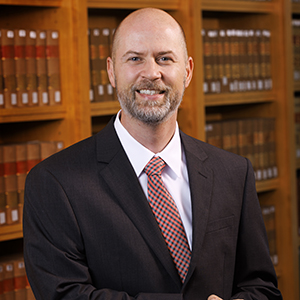Biography
Professor Paul Weitzel joined the UNL faculty in 2022. Prior to that he worked in Silicon Valley and the Middle East conducting international transactions on six continents. His most notable deal was the initial public offering of the Saudi Arabian Oil Company, the largest initial public offering to date. Professor Weitzel’s experience covers mergers and acquisitions, international and domestic capital markets, venture capital and infrastructure.
Professor Weitzel’s research focuses on corporate theory and artificial intelligence. His scholarship considers corporate principles—such as agency, liability and control—in the context of corporate governance, developing technologies and AI agents.
Courses
- Nonprofit Associations 620/G
Advanced course in business law, focusing on the law of not-for-profit businesses. Cover doctrine; learn practice concepts relevant to working as lawyers for nonprofit organizations, and advising nonprofit business clients as outside counsel and inside advisers; become familiar with organization, private governance, and public relations of these entities. Expose students to statutes, case law, regulation and nonprofit entity organization documents. Topics include formation and entity choice; the activities nonprofits can and cannot undertake, including commercial, lobbying, and political activities; fiduciary duties and governance in these entities; forms of fundraising; the investment and use of these entities' funds; and related issues. Pre- or corequisite: Business Associations. - Business Associations 632/G
This course is a survey of the law of for-profit businesses. Students will cover doctrine through statutes and case law; learn practical concepts relevant to advising business clients; and become familiar with transactional documents relevant for advising clients who may be small to mid-sized closely held businesses or participants in them. Topics include the formation, operation, combination, and dissolution of unincorporated and incorporated business firms; as well as the relationships between owners, managers, and other participants in firms, and to a lesser extent their relationships with outsiders. - Mergers & Acquisitions 636
A study of corporate mergers and acquisitions. The course will examine corporate acquisition topics such as the rationale, the process, due diligence, the legal duties of the officers and directors involved, different ways to structure a corporate acquisition, issues in negotiation and contracting, securities law issues, and the role of the lawyers throughout. There will be an emphasis on practical skills and real life transactions. Pre-requisite: Business Association - Introduction to Corporate Compliance BLAW 377
Examines relationships between corporate governance, risk and compliance. Identification and discussion of common features of compliance programs and specific regulations affecting corporate compliance. Discussion of the role of risk assessment and ethical considerations. - Securities Regulation 789 This course is a survey of the federal securities laws that govern how securities like corporate stocks are issued, distributed, and traded. Topics include what securities are, the mandatory disclosure system, securities fraud, what investors find important, insider trading, public and private offerings of securities, resale transactions, liability, and enforcement. Primary focus is on the Securities Act of 1933 and the Securities Exchange Act of 1934, with limited attention to state "blue sky" securities legislation.
- Corporate Finance 746 How do businesses finance operations and growth? How do investors and creditors provide that financing? What is the role of lawyers in facilitating these deals? Students will become familiar with principles that recur in corporate, securities, and bankruptcy litigation. The first half of class focuses on finance for lawyers, and may cover concepts such as basic accounting principles, fundamental and market value, the time value of money and discounting. The second half looks closely at doctrine and transactional private ordering in a firm's capital structure, including various forms of equity and debt financing.
Articles
- Broad Shareholder Value and the Inevitable Role of Conscience, 12 NYU J.L. & Bus. 35 (2015)
- The End of Shareholder Litigation? Allowing Shareholders to Customize Enforcement through Arbitration Provisions in Charters and Bylaws, 2013 BYU L. Rev. 65 (2013)
- Protecting Speech from the Heart: How Citizens United Strikes Down Political Speech Restrictions on Churches and Charities, 16 Tex. Rev. L. & Pol. 155-174 (2011)
Other
Date:
Monday, August 8, 2022
Awards
- James T. Caleshu Award, Lawyers’ Committee for Civil Rights of the San Francisco Bay Area
- Professor of the Year 2024
Media
- McDonald’s Toxic Culture Ruling Sheds Light on Officer Liability Bloomberg Law
- Fox’s Dominion Deal Puts Squeeze on Murdoch in Investor Lawsuits Bloomberg Law
- Ted Turner, longtime Nebraska land baron, still buying as next chapter nears, Flatwater Free Press
- Pension Funds Lead in Corporate Cases, Enhancing Big Fee Demands, Bloomberg Law
- Musk's $56 Billion Appeal Threatens 'Dumpster Fire' Consequences, Bloomberg Law
Education
- B.A., BYU (2006)
- J.D., UCLA (2009)
Areas of Expertise
Appointments
- Assistant Professor of Law, 2022
